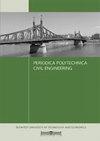Estimation of the Poisson's Ratio of the Rock Mass
IF 1.4
4区 工程技术
Q3 ENGINEERING, CIVIL
引用次数: 0
Abstract
The value of Poisson's ratio is a crucial parameter in rock mechanics and engineering for both intact rock and rock mass. Poisson's ratio has not gotten the attention it merits compared to other essential mechanical characteristics of intact rock and rock mass. Limited relationships exist between rock mass classification systems (such as RMR, RMQR, Q, and GSI) and Poisson's ratio. This paper provides a comprehensive review of models proposed by various researchers for estimating Poisson's ratio for rock mass. The different methods are compared, and new general equations are derived. The results indicate that the Poisson's ratio value of rock mass is inversely proportional to its quality and strength and depends on the Poisson's ratio value of the intact rock. Specifically, a linear equation is obtained using the RMR or GSI system, showing that the Poisson's ratio increases as the quality and strength of the rock mass decrease. The Q system has a logarithmic link between the rock mass quality and Poisson's ratio. It should be noted that the derived equations are applicable only under the assumption of a homogeneous isotropic rock mass.岩体泊松比的估计
泊松比是岩石力学和工程中的一个重要参数,无论对完整岩石还是岩体都是如此。泊松比与完整岩石和岩体的其他基本力学特性相比,其优点尚未得到重视。岩体分类系统(如RMR、RMQR、Q和GSI)与泊松比之间存在有限的关系。本文对各种研究人员提出的岩体泊松比估计模型进行了综合评述。对不同的方法进行了比较,并推导出新的一般方程。结果表明:岩体的泊松比值与岩体的质量和强度成反比,并取决于完整岩体的泊松比值;具体地说,利用RMR或GSI系统得到了一个线性方程,表明泊松比随着岩体质量和强度的降低而增加。岩体质量与泊松比之间的Q系呈对数关系。需要注意的是,导出的方程仅适用于均质各向同性岩体的假设。
本文章由计算机程序翻译,如有差异,请以英文原文为准。
求助全文
约1分钟内获得全文
求助全文
来源期刊

Periodica Polytechnica-Civil Engineering
工程技术-工程:土木
CiteScore
3.40
自引率
16.70%
发文量
89
审稿时长
12 months
期刊介绍:
Periodica Polytechnica Civil Engineering is a peer reviewed scientific journal published by the Faculty of Civil Engineering of the Budapest University of Technology and Economics. It was founded in 1957. Publication frequency: quarterly.
Periodica Polytechnica Civil Engineering publishes both research and application oriented papers, in the area of civil engineering.
The main scope of the journal is to publish original research articles in the wide field of civil engineering, including geodesy and surveying, construction materials and engineering geology, photogrammetry and geoinformatics, geotechnics, structural engineering, architectural engineering, structural mechanics, highway and railway engineering, hydraulic and water resources engineering, sanitary and environmental engineering, engineering optimisation and history of civil engineering. The journal is abstracted by several international databases, see the main page.
 求助内容:
求助内容: 应助结果提醒方式:
应助结果提醒方式:


